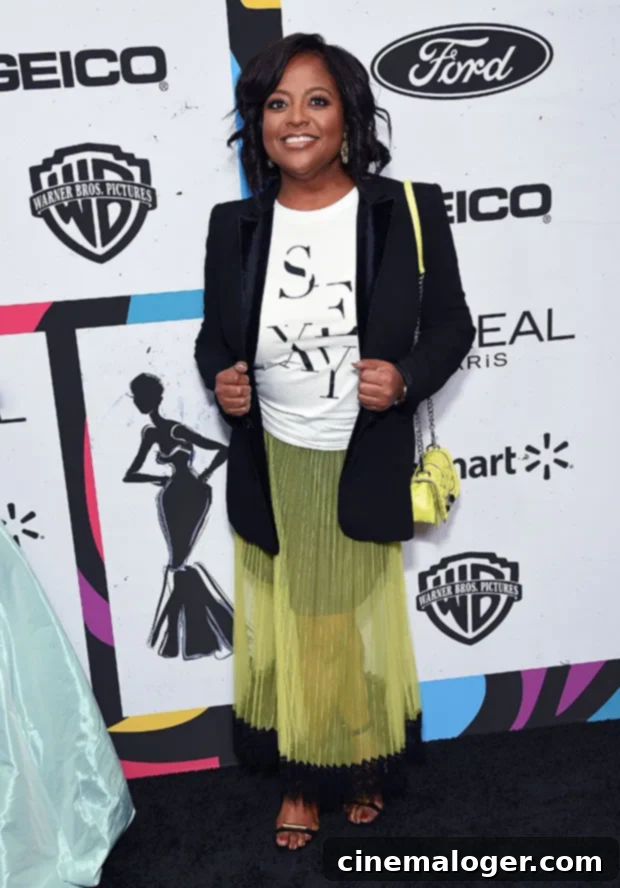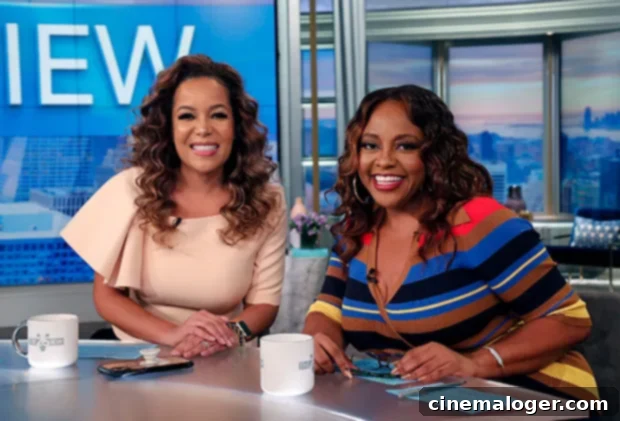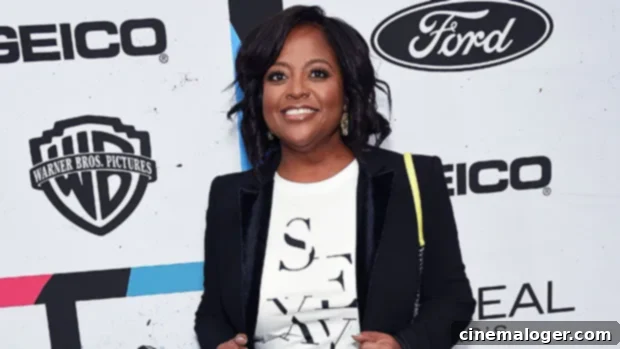Sherri Shepherd’s Bold Revelation: Unpacking Gun Ownership, Personal Safety, and a Bedside Drawer Confession on The View
In a candid and unforgettable segment on the popular talk show The View, veteran television personality Sherri Shepherd ignited a spirited discussion that traversed the serious landscape of personal safety, the rising trend of Black women embracing gun ownership, and a surprisingly intimate detail about her own home defense strategy. During a Tuesday, October 12 episode, Shepherd, a frequent guest co-host, didn’t shy away from revealing her personal approach to protection, sharing a confession that left both her co-hosts and the audience in stitches and deep thought. The conversation unfolded against the backdrop of a significant increase in Black women acquiring firearms over the past year, adding layers of cultural and societal relevance to Shepherd’s personal anecdotes.
The segment commenced with Shepherd directly addressing her decision to become a gun owner. She recounted feeling a profound sense of “helplessness” during the peak of the pandemic, a period marked by widespread uncertainty and social unrest. Notifications about marches and demonstrations encroaching upon her neighborhood further amplified her anxieties. It was this confluence of events that spurred her to take decisive action. “I felt very empowered when I bought this gun,” Sherri declared, explaining her acquisition of a 9mm firearm. Her journey into gun ownership was not impulsive; she meticulously took lessons, passed the requisite tests, and regularly visits a firing range with her girlfriends. This commitment, she elaborated, wasn’t about aggression, but about a fundamental desire to safeguard her family. “It just makes me feel like at least if something happens, I can protect my child,” she articulated, highlighting the primal instinct that often drives individuals to seek means of self-defense.
Sherri’s narrative resonated with many, reflecting a broader demographic shift. The discussion on The View brought to light the notable surge in Black women nationwide deciding to become gun owners. This trend is not merely anecdotal; statistics have shown a significant uptick in firearm purchases among minority groups, particularly women, in recent years. This phenomenon is often attributed to a variety of factors, including a perceived rise in crime, a desire for personal autonomy in safety, and a distrust in traditional protective systems during times of social and political upheaval. For many Black women, the act of acquiring a firearm represents a reclaiming of agency and a proactive stance towards self-preservation in communities that have historically faced disproportionate violence and systemic vulnerabilities. The decision to arm oneself is frequently framed as an act of empowerment, a tangible way to ensure the safety and well-being of oneself and one’s loved ones, transforming feelings of vulnerability into a sense of preparedness and control.

While the initial discussion maintained a serious tone, exploring the motivations and implications of increased gun ownership among Black women, the atmosphere shifted as the segment approached a commercial break. Longtime co-host Joy Behar, known for her sharp wit and ability to inject humor into weighty topics, seized the opportunity to lighten the mood. “I feel if I got a gun, I’d shoot myself. I’d shoot myself in the foot. I’m such a klutz!” Behar quipped, playfully admitting her own lack of coordination and aversion to handling firearms. Her self-deprecating humor served as a perfect segue for Sherri to deliver her now-infamous line. With impeccable comedic timing, Sherri Shepherd leaned into the moment, offering advice on firearm storage that went beyond conventional safety tips. “Keep it in the place where I keep my gun, in the drawer next to my special toys,” she stated, building anticipation before delivering the punchline. “If you come in my house, you’re either going get a happy ending or an ending,” she declared, merging the serious subject of home defense with a unexpected and hilariously risqué double entendre. This candid confession instantly transformed a weighty discussion into a moment of pure, unadulterated television gold.
The humor in Sherri’s comment stemmed from the sheer unexpectedness of the juxtaposition. The idea of a firearm, a tool of potentially lethal force for protection, being stored alongside adult toys, items of pleasure and intimacy, created a striking and undeniably funny image. This unexpected detail provided a moment of levity in an otherwise serious and often polarizing debate about gun control and personal safety. It highlighted Sherri’s distinctive personality—her ability to be simultaneously frank, vulnerable, and uproariously funny. The quip immediately went viral, capturing the attention of viewers and social media users who were both shocked and amused by the intimate revelation. It became a talking point, not just for its comedic value, but also for its underlying message about the multifaceted nature of personal space, individual choices, and how people navigate their sense of security and pleasure within their own homes. Sherri Shepherd’s unique brand of humor once again proved its power to connect with an audience, creating a memorable moment that transcended the typical boundaries of daytime talk show discourse.

Unsurprisingly, Sherri’s frank and astonishing admission sparked a flurry of reactions across social media, particularly on Twitter. Fans were quick to share their amusement, disbelief, and even some cautionary advice. One fan perfectly captured the sentiment of many, exclaiming, “Sherri Shepherd said, ‘I keep my gun in the same place as my toys, so if you come to my house you either going to get a happy ending or an ending.’ I. Hollered. #TheView” This tweet, like countless others, underscored the immediate comedic impact of her statement. Another person humorously cautioned, “If you keep your toy & your gun in the same drawer you better make sure you pick up the right one! Mess around & try to stop an intruder with a vibrator!🤣🤣 #TheView” This playful warning highlighted the absurdity and potential confusion inherent in her storage method, leading to widespread laughter and sharing of the sentiment. A GIF of Whoopi Goldberg laughing hysterically perfectly encapsulated the mood of many viewers, signifying that Sherri’s quip had truly landed as an iconic moment of television.
While the majority of online reactions leaned towards humor and appreciation for Sherri’s candor, a significant portion of the conversation also veered into more serious territory. Some fans, acknowledging the gravity of gun ownership, used the platform to advocate for responsible firearm storage. One concerned individual directly implored Sherri, “UGH Sherri if you got a gun, you need to lock that shit up. You just said you’re trying to protect your son and the way you do that is to lock it up. Not keep it next to your vibrator collection. #TheView” This comment reflected a widespread concern among gun safety advocates who stress the importance of secure storage, especially in homes with children, to prevent accidents, misuse, and suicides. The diverse array of reactions—from outright hilarity to earnest calls for safety—demonstrated how Sherri’s seemingly off-the-cuff remark managed to tap into various facets of public discourse surrounding personal safety, humor, and the responsibilities that come with gun ownership in America. The segment became a microcosm of the larger, often complex, national conversation.
Sherri Shepherd said, “I keep my gun in the same place as my toys, so if you come to my house you either going to get a happy ending or an ending.” I. Hollered. #TheView
— LaDonna Draper (@DeRG) October 12, 2021
@sherrieshepherd If you keep your toy & your gun in the same drawer you better make sure you pick up the right one! Mess around & try to stop an intruder with a vibrator!🤣🤣 #TheView @TheView
— FUND OUR SCHOOLS (@WoodsTigress) October 12, 2021
“If you come in my house you’re gonna get a happy ending or an ending.” 🤣🤣🤣 @sherrieshepherd reveals she keeps her gun in the drawer next to her special toy. #TheView pic.twitter.com/0PRxsWllgQ
— Lonnell Williams (@3LWTV) October 12, 2021
UGH Sherri if you got a gun, you need to lock that shit up. You just said you’re trying to protect your son and the way you do that is to lock it up. Not keep it next to your vibrator collection. #TheView
— ᒪᗩᗪY O’GᗩGᗩ (@holleyr) October 12, 2021
Beyond the humor and the online chatter, the discussion on The View, spurred by Sherri Shepherd’s personal story, highlighted several critical points about gun ownership that extend far beyond individual anecdotes. The co-hosts touched upon sobering statistics, emphasizing that owning a gun, while intended for protection, inherently increases the risk of accidental shootings, domestic violence incidents, and suicide within the home. This crucial aspect of gun safety is often overlooked in conversations dominated by self-defense narratives, yet it remains a paramount concern for public health and safety advocates. Furthermore, the panel delved into the historical context of gun regulations in the United States, pointing out how these laws were frequently implemented with the express, albeit often implicit, intent of disarming or restricting access to firearms within Black communities. This historical injustice adds another layer of complexity to the contemporary conversation surrounding gun ownership among Black women.
The segment effectively underscored the nuanced and often contradictory motivations behind the increasing number of Black women becoming gun owners. It’s a choice often born out of a profound sense of feeling unsafe or inadequately protected by existing systems. For many, it’s a testament to the pursuit of self-reliance and empowerment in a society where safety can feel elusive. Sherri Shepherd’s personal journey, from feeling helpless during the pandemic to embracing responsible gun ownership, encapsulates this powerful narrative. Her revelation, blending a serious commitment to personal safety with an unexpected dash of humor, sparked a multifaceted dialogue that resonated deeply with viewers. It encouraged a closer look at the intersection of race, gender, personal autonomy, and the complex responsibilities that accompany the right to bear arms, ensuring that the conversation around personal protection and the changing landscape of gun ownership continues to evolve and provoke thought in a significant way.
